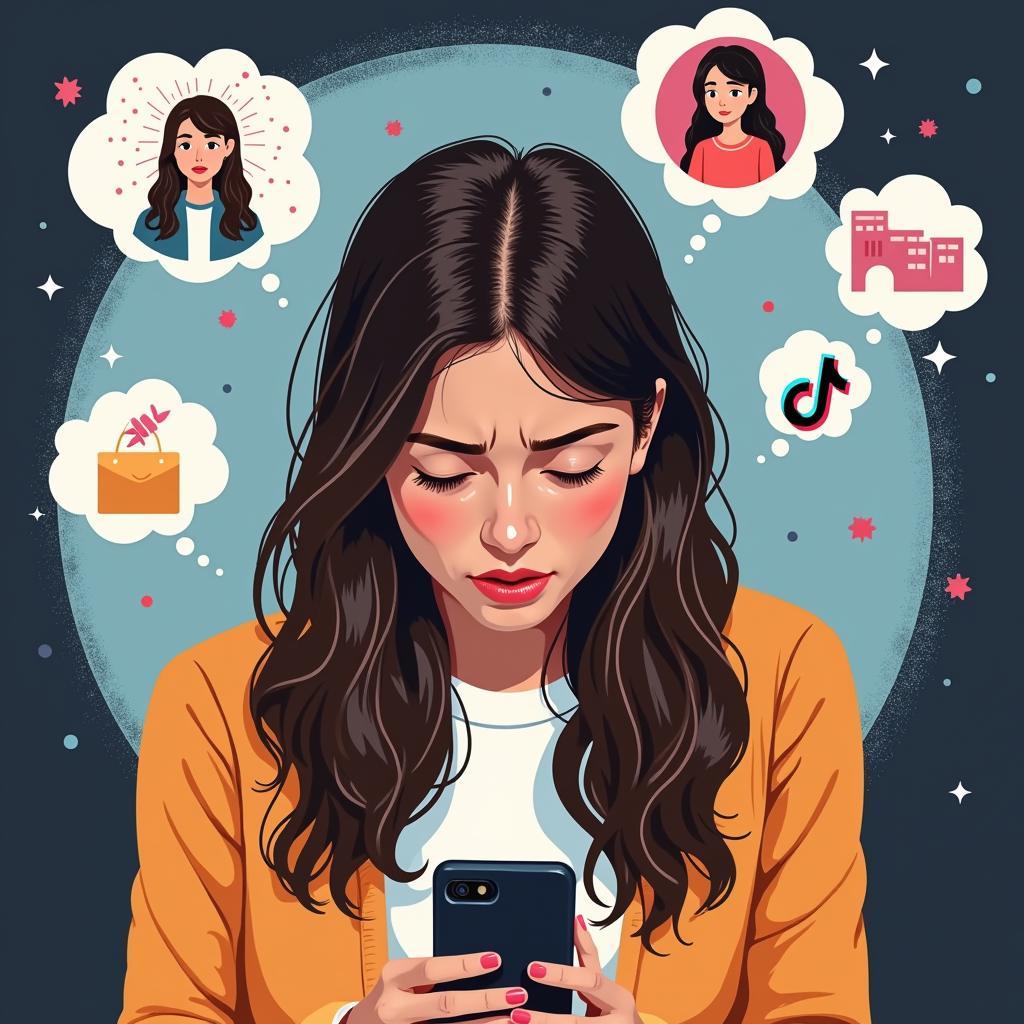Is TikTok ruining society? This question echoes across dinner tables, classrooms, and, ironically, TikTok itself. While the short-form video platform has undeniably become a cultural behemoth, its impact on society is complex and multifaceted, demanding a more nuanced perspective than simple condemnation.
The Perceived Negatives of TikTok
Many concerns revolve around TikTok’s potential negative impact on mental health, particularly among young users. The curated, often unrealistic, portrayals of life can fuel social comparison, anxiety, and body image issues. The algorithm’s addictive nature can also contribute to decreased attention spans and sleep disruption. Furthermore, the rapid spread of misinformation and harmful trends poses a significant challenge. Challenges like dangerous viral challenges and the promotion of unrealistic beauty standards have led many to question the platform’s societal contribution.
 The Impact of TikTok on Mental Health
The Impact of TikTok on Mental Health
Cyberbullying and online harassment are also amplified on TikTok, with its large user base and public-facing nature. The platform’s fast-paced environment can make it difficult to moderate content effectively, allowing harmful comments and videos to proliferate. The pressure to create viral content can also lead to risky behaviors and a blurring of the lines between online persona and real-life identity.
TikTok: A Platform for Positive Change?
However, the narrative that “Tiktok Is Ruining Society” overlooks the platform’s potential for good. TikTok has emerged as a powerful tool for social activism, allowing marginalized voices to be heard and fostering important conversations about social justice, climate change, and mental health awareness.
TikTok has also democratized creativity, providing a platform for artists, musicians, and content creators to share their work with a global audience. The platform’s accessibility has allowed individuals from diverse backgrounds to build communities, connect with like-minded individuals, and even launch successful careers. The short-form video format encourages creativity and innovation, pushing boundaries in storytelling and artistic expression.
Navigating the TikTok Landscape Responsibly
The key to harnessing the positive aspects of TikTok while mitigating its potential harms lies in responsible usage and critical engagement. Parents, educators, and policymakers have a crucial role to play in educating young users about online safety, media literacy, and the importance of maintaining a healthy relationship with technology.
Is TikTok inherently bad?
No, TikTok itself is not inherently bad. Like any tool, its impact depends on how it’s used. Promoting responsible usage, critical thinking, and media literacy are essential for navigating the digital landscape safely and effectively.
How can parents manage their children’s TikTok use?
Open communication, setting clear boundaries, and utilizing parental control features can help manage children’s TikTok usage. Encouraging healthy online habits and fostering critical thinking are crucial for promoting responsible digital citizenship.
Finding Balance in a Digital World
Ultimately, the question of whether TikTok is “ruining society” is too simplistic. The platform, like any technology, is a double-edged sword. It presents both opportunities and challenges. It’s up to us, as individuals and as a society, to cultivate a balanced and informed approach, harnessing the positive potential of TikTok while mitigating its risks. By fostering critical thinking, promoting responsible usage, and engaging in constructive dialogue, we can navigate the digital landscape effectively and shape a future where technology serves the betterment of humanity.
Conclusion
The impact of TikTok on society is complex and requires careful consideration. While concerns about its potential negative effects are valid, dismissing the platform entirely overlooks its positive contributions. By promoting responsible usage, media literacy, and open dialogue, we can harness the power of TikTok for good while mitigating its risks. “TikTok is ruining society” is a statement that demands further investigation and a more balanced perspective.
FAQ
- Is TikTok addictive? Yes, TikTok’s algorithm can be highly addictive, especially for younger users.
- Can TikTok be used for educational purposes? Absolutely, many educators and creators use TikTok to share educational content.
- How can I protect my privacy on TikTok? Utilizing privacy settings and being mindful of the information you share are essential for protecting your privacy.
- Does TikTok promote cyberbullying? Unfortunately, like many online platforms, TikTok can be a breeding ground for cyberbullying.
- What are the benefits of using TikTok? TikTok can be a platform for creative expression, community building, and social activism.
- Is TikTok safe for children? With proper supervision and guidance, children can use TikTok safely.
7.. How can I report inappropriate content on TikTok? TikTok provides reporting mechanisms within the app to flag inappropriate content.
Situations
- Concern about a child’s excessive TikTok use: If your child is spending excessive time on TikTok, open communication and establishing healthy boundaries are essential. Consider utilizing screen time management tools and engaging in family activities that don’t involve technology.
- Exposure to harmful content: If you or your child encounter harmful content on TikTok, utilize the reporting features within the app to flag the content. Discuss the experience and reinforce the importance of critical thinking and online safety.
- Cyberbullying: If you or your child experience cyberbullying on TikTok, document the incidents and report them to the platform. Provide support and guidance, and consider involving school officials or law enforcement if necessary.
Further Exploration
Explore other articles on our website related to social media and its impact on society. We also have resources on digital wellbeing, online safety, and responsible technology use.
If you need assistance, please contact us at Phone Number: 02043854663, Email: [email protected] Or visit our address: Khu 34, Bac Giang, 260000, Vietnam. We have a 24/7 customer support team.